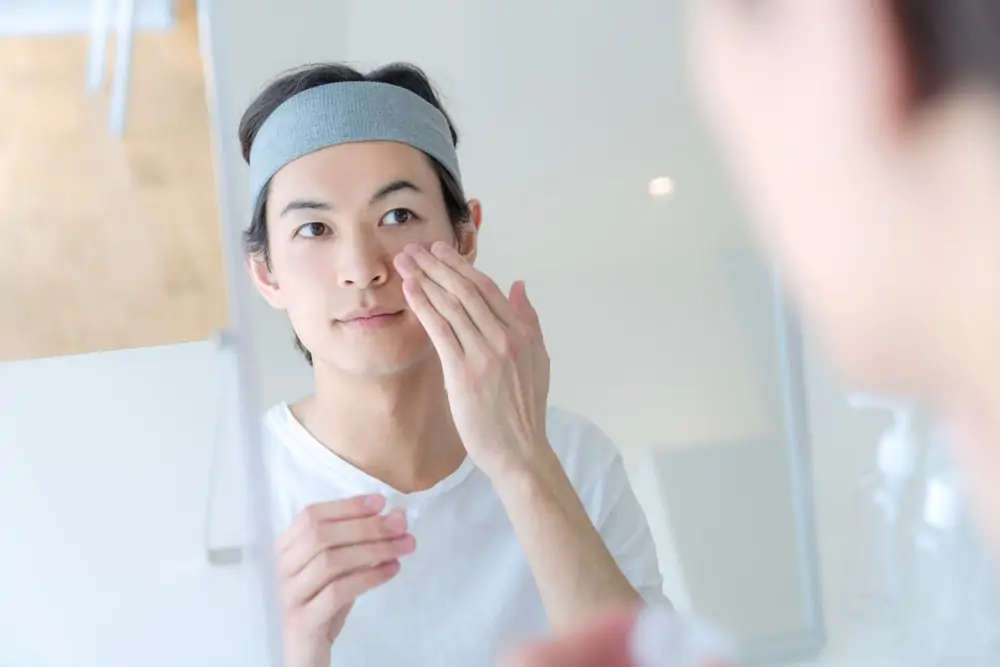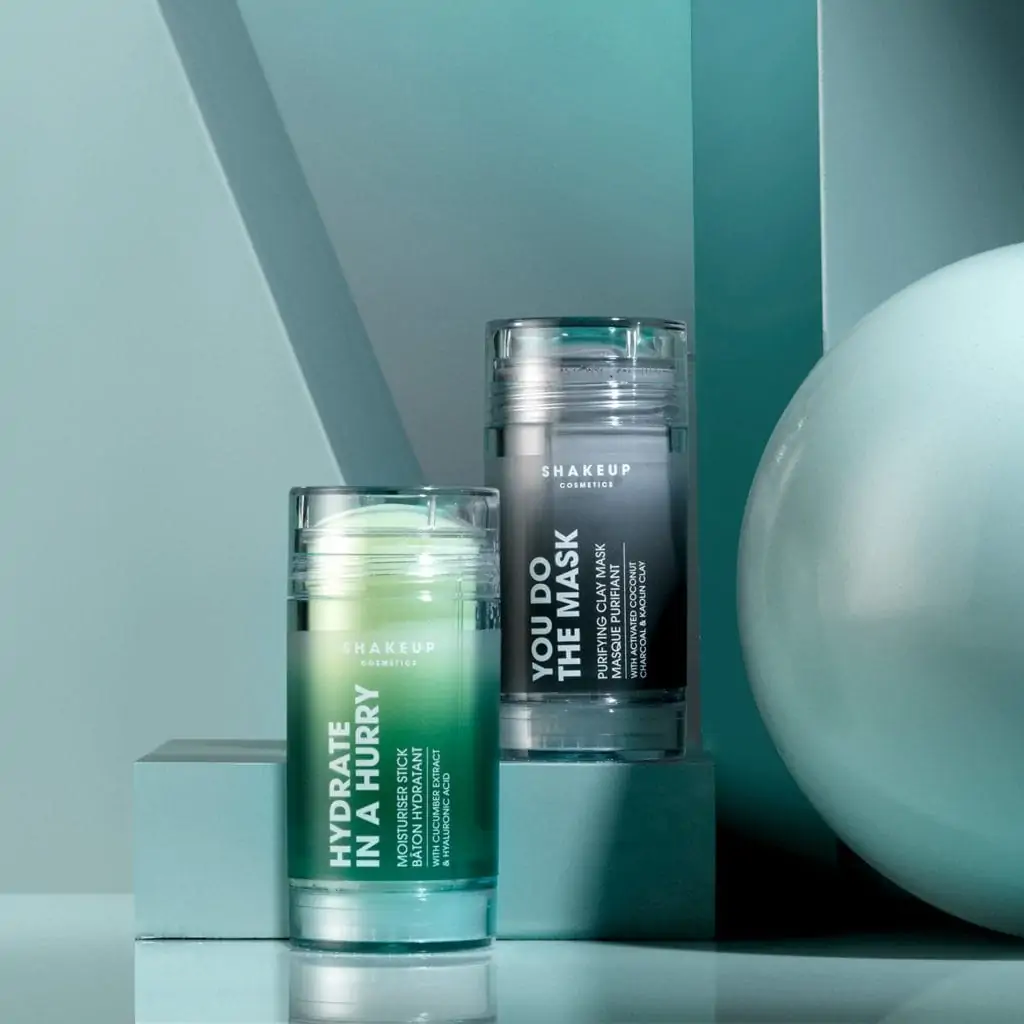With purchases of men’s skincare and cosmetics on the rise around the world, but especially in China, RedFern Digital spoke to Jake Xu, founder of skincare brand Shakeup Cosmetics, to find out what works, how live streaming helps, and what to look out for when choosing a trade partner
Skincare and cosmetics is a crowded market, but one segment that is still developing is products targeted at men. Many men struggle with finding products that they can relate to and can only identify suitable products through a lot of trial and error or asking shop assistants for help, which they may not feel comfortable doing because of the stigma against using cosmetic products as men.
After working with cosmetic beauty brands at their creative agency, twin brothers Jake Xu and Shane Carnell-Xu realised that they wanted to create a brand of their own that addressed these problems, and Shakeup Cosmetics was born. They worked on the formulation with a UK-based manufacturer and chemist team in 2018, and launched the brand in 2019. Currently in its second year, Shakeup Cosmetics is now growing quickly in both the UK and Chinese markets.
RedFern Digital spoke to Jake Xu in an interview originally published in issue five of China market-focused magazine, The RED Edition.
Has the stigma around men’s cosmetics and men’s skincare lessened over the past few years?
The stigma is fading, although not as fast as we would like. In the past couple of years, there has been a big shift among men when it comes to finding different ways to express themselves. One method is through using products that allow them to feel confident or good about themselves. A lot of this has to do with mental health, which is a big issue in both the West and in China.
There has been a social shift in how masculinity is defined by individual men. The #metoo movement has shaken many awake, changing the way they think of masculinity, and encouraging guys to start living their own truth. Many men are no longer buying into the previous blueprint of how a man should look or behave.
Another reason is the generational shift. Younger consumers want sustainable products, they want product variety, and they want inclusivity. Although some demand existed previously, its recent growth and popularity has caused brands and retailers to take notice. Additionally, among these newer generations, gender fluidity is more normalised, which is also driving consumer purchasing behaviour.
Are there any key differences between the men’s cosmetics industry in China and outside of China?
There is definitely a huge difference when it comes to men’s skincare in and outside of China. Countries such as China, Korea and Japan are light years ahead of the West in this category. I think this has been driven by phenomena such as K-pop, Mando-pop and the popularity of ‘xiaoxianrou’ (a term used to describe fresh-faced or young male KOLs in China). By comparison, in the UK, it’s still very much about the more aged-up look, with David Beckham as an example.
When it comes to demographics, Shakeup’s customer base in China tends to be younger than in the West, where a lot of our customers are 35 plus. In China, it is very much the young generation driving demand. Gen-Z consumers purchase more cosmetics and are much more likely to make purchases if they have seen it on Douyin (or it has been recommended by a friend) and it is within their price range.
What trends in men’s skincare are seeing a rise in popularity?
Shakeup Cosmetics focuses on providing products for men that are undetectable when used, so we are currently not looking into developing products such as blushes or eye shadows as we don’t see a demand. The majority of our customers are not looking for that, instead, they want a more natural look. They want to look healthy and have a good, even complexion. Our customers still need education and assistance when it comes to choosing and understanding the purpose of our products.
For our new product development, we focus on ensuring that our products are multifunctional, innovative, and have a great skincare base that provides both long-lasting skincare benefits and the coverage of cosmetics products. Our best product is definitely our BB cream, which is a base product and has been our hero since we launched. Most of our male customers are looking to even out their skin tone and complexion, so products that help with that while remaining undetectable and having a natural finish remain the most popular. Anti-ageing is also a huge concern among customers according to our survey, so it is a function that we are looking to explore.
Which are the most important commercial channels for cosmetics in China, and do you see this changing in the future?
Covid-19 has changed the answer to this question. Online is very important, both in the West and in China. China jumped from being a cash-only society straight to mobile commerce. With this jump, China has also digitised much quicker than other countries. Everybody in China shops online, and even more so since Covid-19 and the lockdown that occurred early on, which allowed online businesses to enjoy a huge boom in the last 18 months.
However, for the cosmetics industry, especially when it comes to skincare and colour, there is still something to be said for the experience of trying it out firsthand. Consumers want to make sure the product is suitable for them or matches their skin tone and are put off by the idea of buying products, having the colour shade be unsuitable for them, then needing to worry about whether the product can be returned. Once consumers have found their perfect product, then repurchasing online is very convenient, with the products delivered directly to the doorstep.
What has been the impact of live streaming on the men’s cosmetics sector in China?
Live streaming has always been quite popular among Chinese consumers. In China, customers enjoy live streams as a form of entertainment and are more open to streamers promoting products or services during live streams, especially compared to customers in the West, who are more cynical and don’t like advertisements. From that perspective, I don’t think live streams will ever be as successful in the West as they currently are in China, because of the differences in culture and preferences.
We actually just did our first live stream for China with the Chinese actor, model and singer Hu Bing (胡兵). It was a great success commercially as we were in the top three best selling brands of the evening for a good part of the live stream, and we were able to learn a lot. Through this experience, it’s clear that live streaming has huge potential, and we will definitely explore this channel more in the future.
What mistakes have you seen other brands make when entering the China market?
One of the big mistakes that brands make has to do with finding the right partner for China market entry. A lot of brands choose to work with trade partners or distributors, and since there are so many of them, it can be difficult to choose the right one. Brands can very easily be dazzled by partners, especially ones that are already working with several big brands. Sometimes, brands may choose to work with a trade partner (TP) that is also handling massive global brands in the belief that the TP can elevate their own brand, but then end up having to end that relationship because their brand is too small for the TP to care about or focus on.
Moreover, the strategy for large established brands is very different to small brands, as these bigger brands already have huge demand from consumers. However, new brands need to be more strategic and careful with their market entry and with choosing the right partner. They should assess every aspect of the partnership and obtain references from previous brands that the TP has worked with before committing. Relationships with TPs can be difficult to sever, and the consequences of choosing the wrong one or of not carefully managing that relationship could include losing ownership of the brand’s online flagship store, or even losing the registration of the products in the China market.





